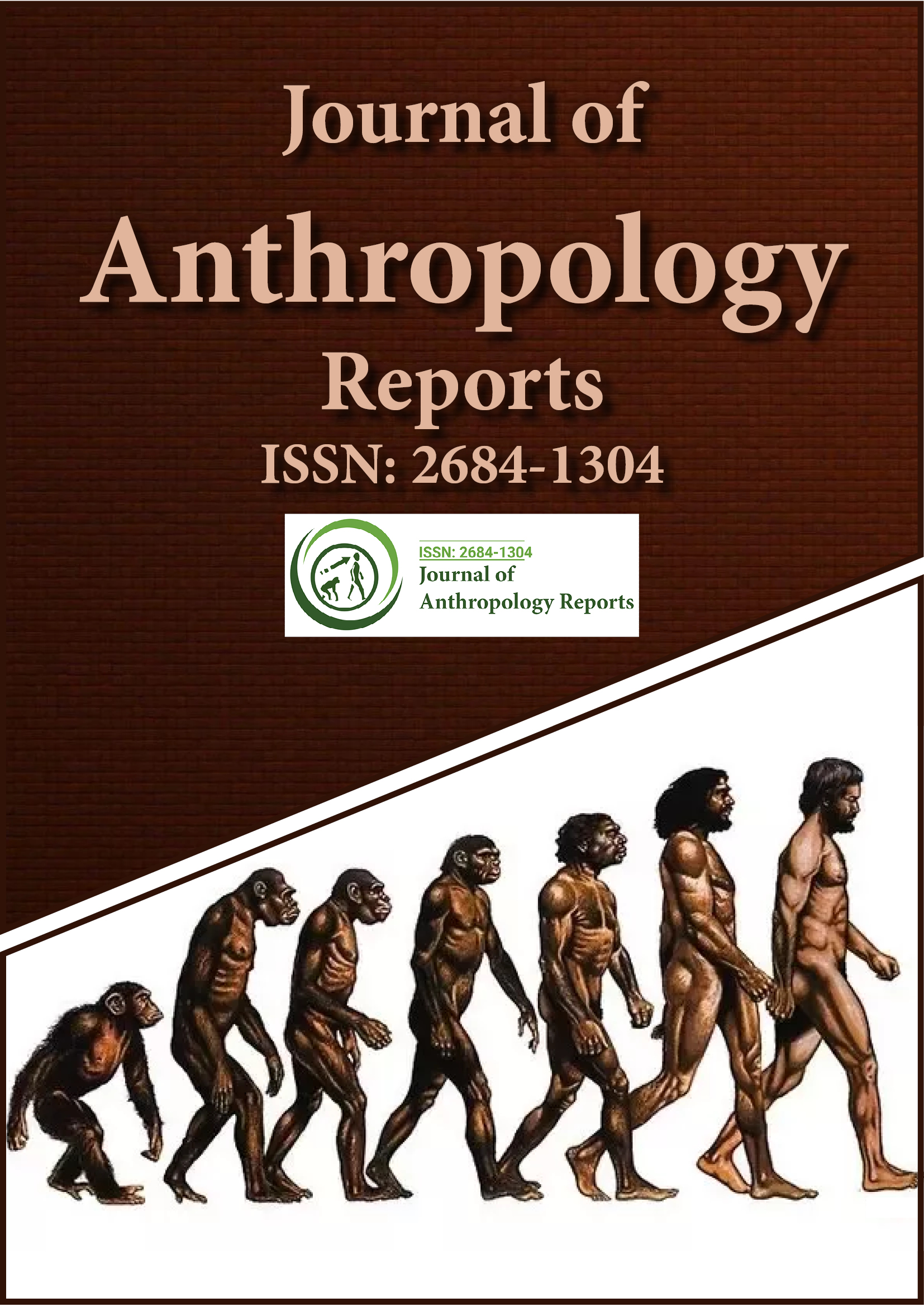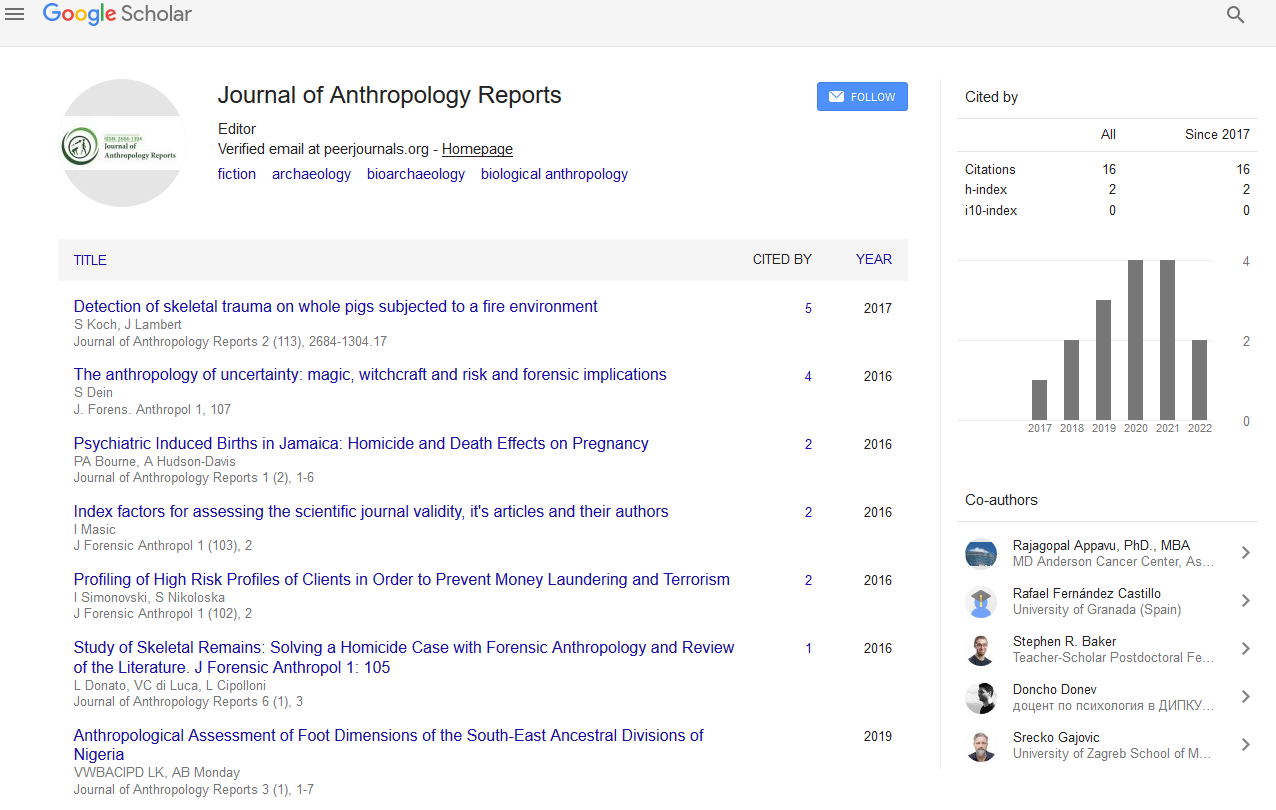Indexed In
- RefSeek
- Hamdard University
- EBSCO A-Z
Useful Links
Share This Page
Journal Flyer

Open Access Journals
- Agri and Aquaculture
- Biochemistry
- Bioinformatics & Systems Biology
- Business & Management
- Chemistry
- Clinical Sciences
- Engineering
- Food & Nutrition
- General Science
- Genetics & Molecular Biology
- Immunology & Microbiology
- Medical Sciences
- Neuroscience & Psychology
- Nursing & Health Care
- Pharmaceutical Sciences
Perspective - (2022) Volume 5, Issue 6
Ethnography: Economic, Cultural and Technological Developments
Mei GaoReceived: 07-Nov-2022, Manuscript No. JFA-22-18977; Editor assigned: 09-Jan-2023, Pre QC No. JFA-22-18977 (PQ); Reviewed: 25-Jan-2023, QC No. JFA-22-18977; Revised: 01-Jan-2023, Manuscript No. JFA-22-18977 (R); Published: 08-Jan-2023, DOI: 10.35248/2684-1304.22.5.145
Description
Ethnography is the method of conducting a descriptive survey of a certain human community. Modern ethnography is mostly dependent on fieldwork and necessitates the anthropologist's total immersion in the culture and way of life of the people he is studying. The distinction between the terms ethnographic and ethnology has sometimes been unclear. The latter, which is a more common phrase in Europe, includes the analytic and analytical study of cultures generally, which is the academic discipline referred to as anthropology in usage. The difference between the two, however, is increasingly being recognized as being more in theory but in practice. Ethnography is inherently comparative because of it’s inter subjective nature. Because the anthropologist on the ground must inevitably have some cultural prejudices, his views and explanations must, to some extent, be comparative. Thus, generalizing about cultures and making comparisons eventually become essential parts of ethnography. Since then, ethnographic fieldwork has developed into a kind of prerequisite for entering the discipline of cultural anthropology. Many ethnographers spend a year or longer in the field, immersing themselves in the culture, picking up the language or dialect and taking part in daily life as much as they can while yet keeping their objectivity as observers.
This technique is known as participant-observation. Ethnographies typically have a community focus rather than an individual one and they concentrate on describing the present rather than the past. In the past, group members' similarities have been highlighted, but modern ethnography has started to show an interest in the significance of variance within cultural systems. Studies of small, primitive civilizations are no longer the only subject matter of ethnographic research; urban ghettos are another possible topic. Since Malinowski's time, the ethnographer's tools have undergone a significant transformation. While thorough field notes remain a must, ethnographers have made the most of technical advancements like movement images and tape recordings to supplement their written descriptions. Healthcare organizations must adapt to and change in the face of rapidly developing technology and greater globalization. Qualitative research methods must also shift. Health researchers now have opportunity to investigate the found naturally and enormous volume of data generated online as a result of the growing usage of web-based platforms for information exchange, providing support networks and monitoring patients. Online research approaches like ethnography have become more prevalent as a result of the quick development of online communities. Ethnography is based on ethnographic techniques that examine the social dynamics of online communities and is adaptable to a wide range of online pursuits. The internationalization of societies, economies and organizations has contributed to the development of team-based ethnography as an alternative to the conventional lone researcher working "in the field." Multisite or worldwide ethnography is a novel conceptualization of ethnography that provides opportunities to investigate the interconnectivity of modern society and may be appropriate to study health systems globally. The researcher can learn about the complexity and shared cultural aspects of the social world and assess the significance of the phenomena under inquiry through this method of absorption in the real-world setting and thorough examination.
Through the researchers' observations, interactions with participants and examination of the context, macro-level exploration of health care organizations can lead to a greater knowledge of the procedures, activities and practices. Even though it has been contend that ethnographic research is only a method for gathering data, from a philosophical standpoint it is about becoming immersed in a culture and the arts of seeing, understanding and interpreting reality through interaction with attendees, either implicitly or explicitly in their natural environment. In this phase, we assess the reviews' papers in light of how their methodologies relate to advancement. We build our argument on the notion that effective improvement depends on a set of behaviors and the associated abilities that are developed through practice and experience. This paragraph is organized around the five "improvers' habits" identified by Lucas: creativity, learning, systems theory, resilience and influencing. We outline the ways by which empirical investigations can support behaviors that improve healthcare under those topics. The use of qualitative research is becoming used as a way to examine service delivery, care delivery and organizational cultures while also knowing healthcare from the perspective of the patient. To gain a thorough grasp of health cultures and investigate complicated phenomena in realistic settings, intensive ethnographic studies are crucial in the field of healthcare.
Citation: Gao M (2022) Ethnography: Economic, Cultural and Technological Developments. J Anthropol Rep. 5:145
Copyright: © 2022 Gao M. This is an open-access article distributed under the terms of the Creative Commons Attribution License, which permits unrestricted use, distribution, and reproduction in any medium, provided the original author and source are credited.

